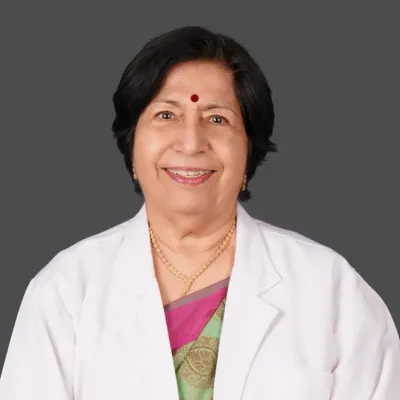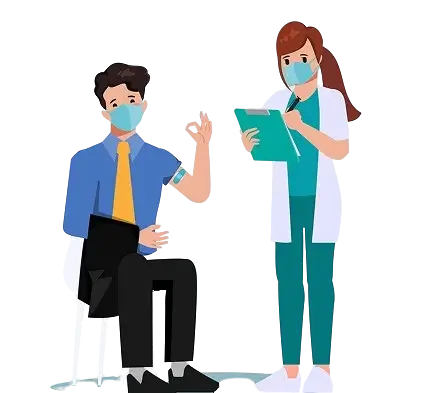
Dr. Pratibha Singhi
Head of Department (HOD)
51 Years of ExperiencePediatric Neurologist
MBBS, MD, FIAP, MNAMS
Reg. No.:5026, Rajasthan Medical Council
English, Hindi
Consultation Fee ₹ 1200
About Dr. Pratibha Singhi
- Dr. Pratibha Singhi is a distinguished Pediatric Neurologist with over 51 years of experience.
- Her expertise lies in the management and treatment of childhood neurological disorders, including seizures and epilepsy in infants and children, cerebral palsy, ADHD and learning disabilities, autism spectrum disorders, neurodevelopmental, behavioral, and psychosomatic disorders, infections of the nervous system, including meningitis and encephalitis, etc.
- Her educational qualifications include MBBS from Jawaharlal Nehru Medical College, 1973, and MD (Pediatrics) from All India Institute of Medical Sciences (AIIMS), New Delhi, in 1978.
- She also earned the Fellowship of the Indian Academy of Pediatrics (FIAP).
- She is recognized for her contributions and was ranked among the top 2 scientists globally in a study conducted by Stanford University, USA.
- Dr. Singhi has led multiple international research projects with organizations such as WHO, INDO UK, INDO-EU, and INDO-Swedish.
- Her extensive research output includes approximately 500 scientific papers and book chapters.
- She is the author of a book titled "Seizures and Epilepsy in Children" and has edited four books, including the ICNA publication on "CNS Infections."
- Dr. Singhi currently serves as the President of the International Child Neurology Association (ICNA) and is a founding member of prominent groups focusing on Child Neurology and Childhood Disability in India.
- She has held significant leadership roles in professional organizations, including President of the Association of Child Neurology and Vice President of the Indian Academy of Cerebral Palsy.
- She is a sought-after speaker and chairperson at both national and international conferences, having participated in over 450 events.
- Dr. Singhi has served as a Visiting Professor at prestigious universities worldwide, including Johns Hopkins University, Boston Children's Hospital, and Karolinska Institute, Stockholm.
- Throughout her career, Dr. Singhi has received numerous accolades, including gold medals, the President of India Medal, research awards, orations, scholarships, and fellowships.
- She is fluent in English and Hindi.
Book Your Appointment With Dr. Pratibha Singhi
Get a Treatment Plan Within 1 Hour
Education
- MBBS, Jawaharlal Nehru Medical College, 1973
- MD (Pediatrics), All India Institute of Medical Sciences (AIIMS), New Delhi, 1978
- Fellowship of Indian Academy of Pediatrics (FIAP)
- National Academy of Medical Sciences (MNAMS)
Past Experience
- Head of Department (pediatric neurology) Postgraduate Institute of Medical Education and Research (PGIMER), Chandigarh
- Head of Department, Medanta - The Medicity, Gurgaon
- Visiting Professor, John Hopkins University, Baltimore
- Visiting Professor, Boston Children's Hospital
- Visiting Professor, Indiana University and Detroit Wayne State University USA
- Visiting Professor, Hospital for Sick Kids Toronto
- Visiting Professor, Karolinska Institute – Stockholm
Awards
- Frank Ford Award of the International Child Neurology Association (ICNA) for Life Time Scientific Achievement in pediatric Neurology and Contribution to ICNA (2022).
- KC Choudhary Award of the IJP for Lifetime Achievement in paediatrics-Neurology (2022).
- First S. Janaki Memorial Oration by the National Academy of Medical Sciences (2013) for outstanding contribution to pediatric and Adolescent Neurology.
- Awarded the Oration of The growth and Development Chapter of IAP at the GDBPCON 2016, Pune 10th December 2016 Oration on "Neurodevelopmental Disorders –Role of pediatrician."
- Awarded the First PK Mishra Oration on "Cerebral Palsy and its management-recent Concepts" to mark the First Foundation Day Celebration of 53rd. Foundation day of King George Medical University Lucknow, 14th November 2006.
- Received the Best Paper award from BMJ South Asia Awards on 30th October 2015, for the paper "Randomized Controlled Trial Comparing Cerebral Perfusion Pressure-Targeted Therapy Versus Intracranial Pressure-Targeted Therapy for Raised Intracranial Pressure due to Acute CNS Infections in Children.
- Awarded the Oration of the Association of Child Neurology from 12-14 February 2016 for Life Time Achievement in pediatric Neurology and Neurodevelopment.Awarded Fellowship of National Academy of Medical Sciences 2009. for outstanding contributions to Medical Sciences, especially in Child Neurology and Neurodevelopment.
- Awarded "Medical Scientist Award" by Dr. Shurvir Singh Trust, Rajasthan, for the year 2002-03 for outstanding contributions to Medical Sciences, especially in pediatric Neurology and Neurodevelopment.
- Asian Research Award. Awarded in recognition of outstanding contribution to advancements in understanding Infantile Seizures at the 6th Infantile Seizure Society Meeting Tokyo Japan 15-16 Mar 2003.
- James Flett Gold Medal (First Prize) of the Indian Academy of Paediatrics in 1987 for research in Social pediatrics.
Associations/Membership
- International Child Neurology Association (ICNA)
- Asian Oceanian Child Neurology Association (AOCNA)
- European Pediatric Neurology Society (EPNA)
- International Society for Behaviour and Development (ISBD)
- American Pediatric Society
- Commonwealth Association for Mental Handicap and Development Disabilities (CAMHADD)
- New York Academy of Sciences
- Indian Academy of Pediatrics (IAP)
- Association of Child Neurology (AON)
- Indian Academy of Cerebral Palsy (IACP)
- Disability Chapter of IAP
- Neurology Chapter, IAP
- Indian Council for Child Welfare (ICCW)
- Indian Academy of Neurology (IAN)
Paper Published
Dr. Pratibha Singhi has over 454 publications to her name, some of which are mentioned below:
- Genetic landscape of congenital insensitivity to pain and hereditary sensory and autonomic neuropathies.
- Early Diagnosis and Management of Autism Spectrum Disorder (ASD) in Low-Resource Countries-Challenges and Strategies.
- Early Diagnosis of Autism Spectrum Disorder: What the Pediatricians Should Know?
- Detection of IEMs by Mass Spectrometry Techniques in High-Risk Children: A Pilot Study.
- Seizure Semiology, Location of Lesion on Neuroimaging, and Interictal Electroencephalographic (EEG) Abnormalities in Children With Single-Lesion Neurocysticercosis—Is There a Correlation?
- Status Dystonicus in Children: A Cross-Sectional Study and Review of Literature
- Clinical Features Associated With Need for Mechanical Ventilation in Children With Guillain-Barré Syndrome: Retrospective Cohort From India.
- Efficacy of Combination Therapy of Albendazole and Praziquantel vs Albendazole Monotherapy in Children With Persistent Neurocysticercosis: A Randomized Controlled Trial.
- Evaluation of Hyperandrogenism in Children with Autism Spectrum Disorder.
- Hereditary Sensory and Autonomic Neuropathy: A Case Series of Six Children
- Magnitude, determinants, and impact of treatment lag in West syndrome: A prospective observational study.
- Screening Children with Epilepsy for Behavioral Problems: Utility of the Strength and the Difficulties Questionnaire.
- Epilepsy and EEG Abnormalities in Children with Autism Spectrum Disorders
- Comparison of Long-Term Outcomes Between 7 Days and 28 Days Albendazole Monotherapy in the Treatment of Single-Lesion Neurocysticercosis in Children.
- Epilepsy and Neurodevelopmental Outcomes in a Cohort of West Syndrome Beyond Two Years of Age.
- Add-on Home-Centered Activity-Based Therapy vs Conventional Physiotherapy in Improving Walking Ability at 6-Months in Children With Diplegic Cerebral Palsy: A Randomized Controlled Trial.
- Comparison of 4 weeks versus 12 weeks antiseizure medication for acute symptomatic seizures in children with Acute Encephalitis Syndrome: An open-label, randomized controlled trial.
- Management of Neurocysticercosis in Children: Association of Child Neurology Consensus Guidelines.
- Randomized trial of high-dose pyridoxine in combination with standard hormonal therapy in West syndrome. https://authors.elsevier.com/c/1dCyN3mqOkFEIh (full text available for 50 days).
- Long-term epilepsy control, motor function, cognition, sleep and quality of life in children with West syndrome.
- An Update to Approach to the Childhood Electroclinical Syndromes
- A prospective cohort study to assess the frequency and risk factors for calcification in single lesion parenchymal neurocysticercosis. Article, Dec 2020.
- Intensive Care Unit-Acquired Weakness in Children: A Prospective Observational Study Using Simplified Serial Electrophysiological Testing (PEDCIMP Study).
- Safety, Feasibility, and Effectiveness of Pulse Methylprednisolone Therapy in Comparison with Intramuscular Adrenocorticotropic Hormone in Children with West Syndrome.
- Randomized Clinical Trial of 20% Mannitol Versus 3% Hypertonic Saline in Children With Raised Intracranial Pressure Due to Acute CNS Infections.
- Comparative evaluation of IS6110 and protein antigen b PCR in cerebrospinal fluid to rapidly diagnose tuberculous meningitis in children.
- Decompressive craniectomy in pediatric non-traumatic intracranial hypertension: a single center experience.
- Prevalence and Characteristics of Sensory Processing Abnormalities and its Correlation with FDG-PET Findings in Children with Autism.
- Spontaneous intracranial hemorrhage in children—intensive care needs and predictors of in-hospital mortality: a 10-year single-center experience
- How Different is AMAN from AIDP in Childhood GBS? A Prospective Study from North India.
- Intensive care needs and predictors of in-hospital mortality following Spontaneous Intracranial Hemorrhage in Children - A ten-year single center retrospective study.
- Experience with Glucocorticoid Therapy in Boys with Duchenne Muscular Dystrophy from North India: A Prospective Cohort Study.
- Safety, tolerability, and effEffectiveness oral zonisamide therapy in comparison with intramuscular adrenocorticotropic hormone therapy in infants with West syndrome.
- Home-based Sensory Interventions in Children with Autism Spectrum Disorder: A Randomized Controlled Trial.
- Sleep Dysfunction and Behavioral Daytime Problems in Children with Autism Spectrum Disorders: A Comparative Study.
- Long-term Cognitive Outcome of Children With Parenchymal Neurocysticercosis: A Prospective Observation Study.
- G302 Comparison of 4-week versus 12-week anti-convulsant therapy for acute symptomatic seizures in children with acute encephalitis syndrome- an open-label, randomized controlled trial.
- Spectrum of Neurological manifestations and outcome in children with Combined Methylmalonic Aciduria and Hyperhomocysteinemia.
- Thiamine Responsive Pyruvate Dehydrogenase Complex Deficiency: A Potentially Treatable Cause of Leigh's Disease.
- Efficacy of pulse methylprednisolone vs adrenocorticotropic hormone in children with West Syndrome: An open-label pilot trial.
- Title: Clinical Profile and Neurodevelopmental Outcome of New-onset Acute Symptomatic Seizures in Children.
- (MS3-2C-3) Comparison of Home-Centred Activity-Based Therapy and Conventional Physiotherapy in Children with Diplegic Cerebral Palsy: A Randomized Controlled Trial.
- G391(P) Evaluation of cutaneous adverse drug reactions in north Indian children with unprovoked seizures on antiepileptic drug monotherapy.
- Clinical and Radiological profile of children with Central Nervous System Arterio Venous Malformation – A single-center experience.
- Obstructive Hydrocephalus in Pyridoxine-Dependent Epilepsy: An Uncommon Complication.
- Hereditary Sensory Polyneuropathy, Pain Insensitivity, and Global Developmental Delay due to Novel Mutation in PRDM12 Gene.
- Role of Rifampin in Reducing Inflammation and Neuronal Damage in Childhood Bacterial Meningitis: A Pilot Randomized Controlled Trial.
- Hyperhomocysteinaemia in children receiving phenytoin and carbamazepine monotherapy: A cross-sectional observational study.
- Predictors of Neurological Outcome of Tuberculous Meningitis in Childhood: A Prospective Cohort Study From a Developing Country.
- Effectiveness of virtual reality rehabilitation for children and adolescents with cerebral palsy: an updated evidence-based systematic review.
- Syndrome of Hepatic Cirrhosis, Dystonia, Polycythemia, and Hypermagnesemia Caused by Mutations in SLC30A10, a Manganese Transporter in Man.
- Recurrent Facial Palsy and Electrophysiological Findings in Oligosymptomatic Melkersson Rosenthal Syndrome.
- "EffEffeEffectivenesse-based sensory interventions along with standard therapy versus standard therapy alone in children with Autism spectrum disorders having sensory processing abnormalities: A Randomized trial.
- Imaging Findings in Pediatric Posterior Reversible Encephalopathy Syndrome (PRES): 5 Years of Experience From a Tertiary Care Center in India.
- Subacute Sclerosing Panencephalitis presenting as Acute Cerebellar Ataxia and Brain Stem Hyperintensities.
- Survival and neurological outcome following in-hospital pediatric cardiopulmonary resuscitation in North India.
- Neurodevelopmental and Behavioral Outcomes in Children With Sepsis-Associated Encephalopathy Admitted to Pediatric Intensive Care Unit: A Prospective Case-Control Study.
- Epilepsy with continuous spikes and waves during slow-wave sleep: A study of 22 children from a single center.
- Changing etiology and predictors of outcome in children with acute CNS infections: A prospective hospital-based study.
- Randomized Controlled Trial Comparing Cerebral Perfusion Pressure-Targeted Therapy Versus Intracranial Pressure-Targeted Therapy for Raised Intracranial Pressure Due to Acute CNS Infections in Children.
- Analysis of 26 amino acids in human plasma by HPLC using AQC as a derivatizing agent and its application in metabolic laboratory.
- Contrast-enhanced magnetic resonance imaging (MRI) of the brain shows infarction involving the left basal ganglia left insular region (middle cerebral artery territory), and frontal cortex (anterior cerebral artery territory).
- MRI 2 T1: Contrast-enhanced magnetic resonance imaging (MRI) of the brain showing infarct involving the left basal ganglia and left insular region (middle cerebral artery territory) and frontal cortex (anterior cerebral artery territory).
- Contrast-enhanced magnetic resonance imaging (MRI) of the brain showing infarct involving the left basal ganglia and left insular region (middle cerebral artery territory)
- Mycotic Aneurysm and Subarachnoid Hemorrhage Following Tubercular Meningitis in an Infant With Congenital Tuberculosis and Cytomegalovirus Disease.
- Syndrome of Hepatic Cirrhosis, Dystonia, Polycythemia, and Hypermagnesemia Caused by Mutations in SLC30A10, a Manganese Transporter in Man.
- 2D-PAGE analysis of Taenia solium metacestode 10–30kDa antigens for the serodiagnosis of neurocysticercosis in children.
- Simultaneous detection of 26 amino acids in human plasma using 6-aminoquinoly-N-hydroxy succinimidyl carbamate (AQC) as derivatizing agent
- Two-dimensional gel electrophoresis analysis of T. solium cysticerci lower molecular mass (10–30 kDa) antigens for the serodiagnosis of neurocysticercosis in children
- Neurocysticercosis immunodiagnosis using Taenia solium Cysticerci crude soluble extract, excretory-secretory, and lower molecular mass antigens in serum and urine samples of Indian children
- Combination Therapy With Albendazole and Praziquantel Versus Albendazole Alone in Children With Seizures and Single Lesion Neurocysticercosis: A Randomized, Placebo-Controlled Double-Blind Trial.
- Quality of life, psychosocial stressors and adverse life events in children with recurrent headaches from a developing country.
- Intravenous Sodium Valproate Versus Diazepam Infusion for the Control of Refractory Status Epilepticus in Children: A Randomized Controlled Trial.
- Intravenous Sodium Valproate Versus Diazepam Infusion for the Control of Refractory Status Epilepticus in Children: A Randomized Controlled Trial.
- Evaluation of ELISA and dot blots for the serodiagnosis of neurocysticercosis in children found to have single or multiple enhancing lesions in computerized tomographic scans of the brain.
Field of Expertise
- Aneurysm Coiling
- Brain AVM Embolization with Onyx
- Brain Surgery
- Carotid Angioplasty and Stenting
- Carotid Endarterectomy (CEA)
- Cerebral Angiogram
- Cerebral Angioplasty
- Cervical Artificial Disk Replacement
- Chronic Cerebro Spinal Venous Insufficiency (CCSVI)
- Cognitive Behavioral Therapy (CBT)
- Corpus Callosotomy
- Craniofacial Reconstruction Surgery
- Cranioplasty
- Craniotomy
- CyberKnife Surgery
- Decompressive Craniectomy
- Deep Brain Stimulation (DBS)
- Digital Nerve Repair
- Electroconvulsive Therapy
- Endovascular Surgery for AVMs
- Epilepsy Surgery
- Gamma Knife Surgery
- Hemispherectomy
- High Cervical Stimulation
- Hydrocephalus Treatment
- Image-Guided Neurosurgery
- Intrathecal Pain Pump
- Lesionectomy
- Liberation Therapy
- Meningioma Treatment
- Microsurgery for Arteriovenous Malformations (AVMs)
- Microsurgical Tumor Removal
- Microvascular Decompression (MVD)
- Minimally Invasive Brain Surgery
- Minimally Invasive Surgery for Brain Tumor
- Multiple Sclerosis Treatment
- Multiple Subpial Transections (MST)
- Nerve Repair Surgery
- Neuroendoscopy
- Neurosurgery
- Pediatric Neurosurgery
- Percutaneous Balloon Compression (PBC)
- Percutaneous Stereotactic Radiofrequency Rhizotomy (PSR)
- Peripheral Nerve Surgery
- Pituitary Tumor Treatment
- Rhizotomy
- Robotic-Assisted Nephroureterectomy
- Skull Base Surgery
- Speech Therapy
- Spinal Cord Stimulation
- Stereotactic Radiosurgery (SRS)
- Temporal Lobectomy
- Thecoperitoneal Shunt
- Transcutaneous Electrical Nerve Stimulation (TENS)
- Vagus Nerve Stimulation
- Ventriculostomy
- Vertebroplasty and Kyphoplasty
- VP Shunt
- Acoustic Neuroma
- Acute Disseminated Encephalomyelitis (ADEM)
- Acute Flaccid Myelitis
- Acute Flaccid Myelitis (AFM)
- ALD (Adrenoleukodystrophy)
- Alzheimer's Disease
- Amnesia
- Amyloidosis
- Amyotrophic Lateral Sclerosis (ALS)
- Anaplastic Astrocytoma
- Anxiety Disorder (Hypochondria, Hypochondriasis)
- Arachnoid Cysts
- Arteriovenous Fistula (AVF)
- Arteriovenous Malformation (AVM)
- Arthritis of the Spine (Spondylosis)
- Astrocytoma
- Ataxia
- Atypical Parkinsonism
- Autism Spectrum Disorder
- Avoidant Personality Disorder
- Back Pain in Athletes
- Back Strains and Sprains
- Basal Ganglia Stroke
- Bell's Palsy
- Benign Rolandic Epilepsy
- Bipolar Disorder
- Bipolar Psychosis
- Bladder and Bowel Dysfunction in Multiple Sclerosis (MS)
- Body Dysmorphic Disorder
- Botulism
- Brachial Plexus Palsy
- Brain Aneurysm
- Brain Atrophy
- Brain Cancer (Brain Tumor)
- Brain Hemorrhage
- Brain Stem Glioma
- Brain: Temporal Lobe, Vagal Nerve, & Frontal Lobe
- Carotid Artery Stenosis
- Cerebellopontine Angle (CPA) Tumors
- Cerebral Cavernous Malformation (CCM)
- Cerebral Palsy
- Cerebrovascular Insufficiency
- Cervical Spinal Stenosis
- Cervical Spondylosis
- Charcot-Marie-Tooth Disease
- Chiari Malformation
- Childhood Schizophrenia
- Chordomas
- Choroid Plexus Tumor
- Chronic Migraine
- Chronic Spine and Back Pain
- Chronic Traumatic Encephalopathy (CTE)
- Circadian Rhythm Sleep Disorders
- Cluster Headaches
- Congenital Malformations of the Brain and Spine
- Convexity Meningioma
- Craniofacial Malformations
- Craniopharyngioma
- Craniosynostosis (Craniostenosis)
- Cubital Tunnel Syndrome
- Degenerative Disc Disease
- Dementia
- Developmental Delay in Children
- Devic's Disease (Neuromyelitis)
- Discitis
- Dissociative Amnesia
- Dissociative Disorders
- Duchenne Muscular Dystrophy (DMD)
- Dysembryoplastic Neuroepithelial Tumor (DNET)
- Dyslexia
- Dystonia
- Encephalitis
- Encephalocele
- Ependymoma
- Epilepsy
- Essential Tremor
- Factitious Disorders
- Febrile Seizures
- Fibrillary Astrocytoma
- Frontal Lobe Epilepsy
- Frontotemporal Dementia (FTD)
- Generalized Seizures
- Glioblastoma Tumors
- Gliomas Tumors
- Glossopharyngeal Neuralgia (GPN)
- GLUT-1 Deficiency
- Guillain-Barre Syndrome (GBS)
- Headache
- Headaches in Children and Adolescents
- Hemangioblastoma
- Hemangiopericytoma
- Hemicrania Continua
- Hemimegalencephaly
- Herniated Disk (Slipped, Ruptured or Bulging Disk)
- HIV Neuropathy
- HIV-Associated Dementia
- Hydrocephalus
- Hydrocephalus in Children
- Hyperkalemia (High Potassium)
- Hypothalamic Hamartoma
- Hypothermia (Low Body Temperature)
- Idiopathic Intracranial Hypertension (IIH)
- Idiopathic Neuropathy
- Infantile Spasm
- Insomnia
- Joubert Syndrome
- Juvenile Myoclonic Epilepsy
- Juvenile pilocytic astrocytoma (JPA)
- Kleine-Levin Syndrome
- Korsakoff's Syndrome
- Leukodystrophy
- Lewy Body Dementia
- Lower Back Pain
- Lumbar Spinal Stenosis
- Lyme Disease
- Malignant Peripheral Nerve Sheath Tumor (MPNST)
- Medulloblastoma
- Meningioma
- Meralgia Paresthetica
- Metastatic Spinal Tumors
- Metastatic Tumors
- Migraines in Children and Adolescents
- Mild Cognitive Impairment
- Mild Cognitive Impairment (MCI)
- Mitochondrial Diseases
- Motor Neuron Disease
- Motor Stereotypies
- Moyamoya Disease
- Multiple Sclerosis (MS)
- Muscular Dystrophy
- Myasthenia Gravis (MG)
- Myoclonic Atonic Epilepsy
- Narcolepsy
- Narcolepsy in Children
- Neck Sprain
- Nerve Injury
- Nerve Sheath Tumor
- Neuroblastoma
- Neurofibroma
- Neurofibromatosis Type 1 (NF1)
- Neurofibromatosis Type 2 (NF2)
- Neurogenic Bladder
- Normal Pressure Hydrocephalus (NPH)
- Obsessive-Compulsive Disorder
- Occipital Neuralgia
- Olfactory Neuroblastoma
- Oligodendroglioma
- Oppositional Defiant Disorder
- Optic Nerve Glioma
- Optic Neuritis
- Osteoma
- Paralysis
- Paraplegia
- Parkinson's Disease
- Partial Seizures
- Pediatric Brain and Spine Injuries
- Pediatric Multiple Sclerosis
- Periodic Limb Movement Disorder (PLMD) in Adults
- Peripheral Neuropathy
- Peroneal Nerve Injury
- Persistent Depressive Disorder (PDD)
- Pituitary Adenoma
- Pituitary Tumor
- Poland Syndrome
- Postherpetic Neuralgia
- Postpartum Depression
- Primary Central Nervous System (CNS) Lymphoma
- Pseudomeningocele
- Rasmussen's Encephalitis
- Rathke's Cleft Cysts (RCCs)
- Restless Leg Syndrome
- Reversible Cerebral Vasoconstriction Syndrome
- Schizoaffective Disorder
- Schizophrenia
- Schwannomas
- Seizures
- Sensory Ataxia
- Skeletal Dysplasia
- Small Fiber Sensory Neuropathy (SFSN)
- Spasticity
- Spina Bifida
- Stiff Person Syndrome
- Stroke
- Sturge Weber Syndrome
- Subarachnoid Hemorrhage (SAH)
- Subcortical Vascular Dementia
- Subdural Hematoma
- Susac Syndrome
- Syringomyelia
- Systemic Lupus Erythematosus
- Tarsal Tunnel Syndrome (TTS)
- Tethered Spinal Cord Syndrome
- Tonic-Clonic Seizures
- Torticollis
- Tourette Syndrome
- Transient Global Amnesia (TGA)
- Transient Ischemic Attack (TIA) or Mini Stroke
- Transverse Myelitis
- Traumatic Brain Injury
- Trichotillomania
- Trigeminal Neuralgia
- Vasculitic Neuropathy
- Vestibular Schwannoma
Could not find what you are looking for?
No worries — just tell us what you need, and our experts will guide you personally.
Best Neurology Doctors in India


Dr. S R L Neeharika
Consultant
Pediatric Neurologist
Manipal Hospital, Millers Road, Bangalore

Dr. Usha Mallinath
Consultant
Pediatric Neurologist, Pediatrician
Manipal Hospital, Varthur Road, Bangalore

Dr. Sameeta Mercy Prabhu
Consultant
Pediatric Neurologist
Rainbow Children's Hospital & BirthRight, Hebbal, Bengaluru

 WhatsApp Us
WhatsApp Us
